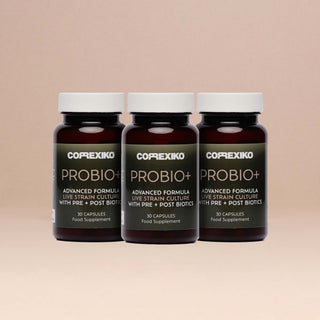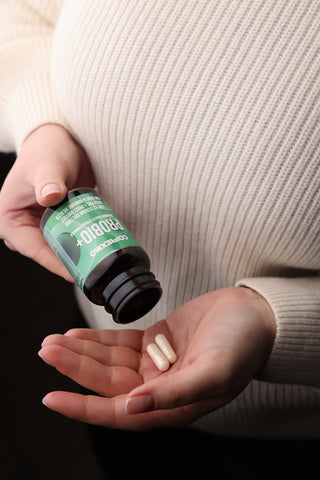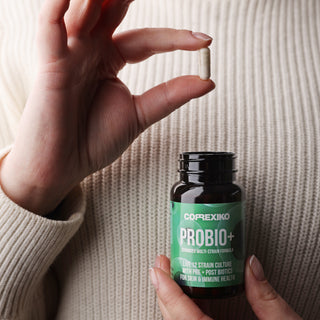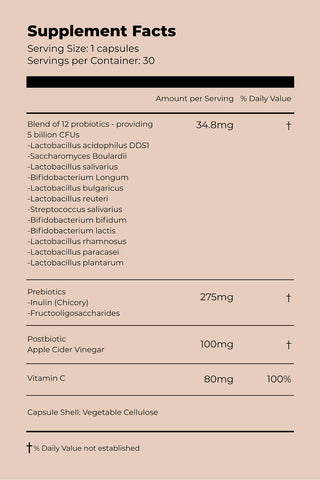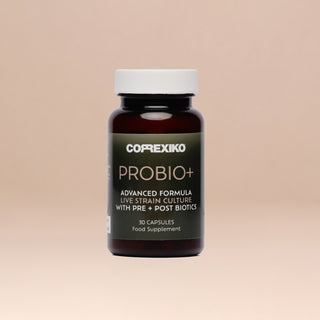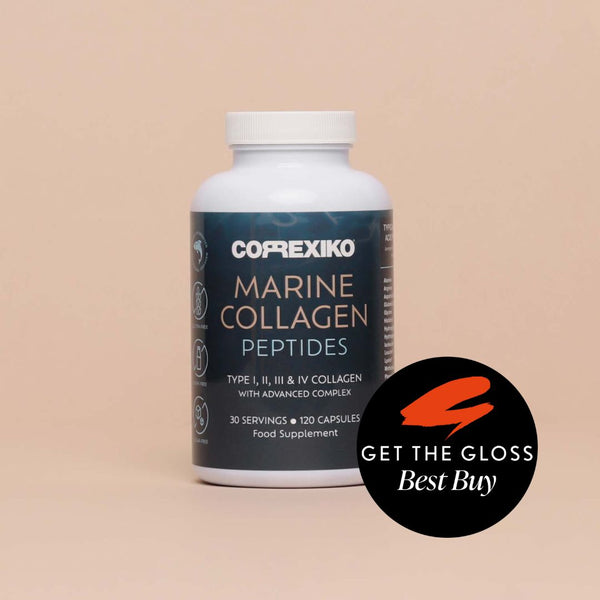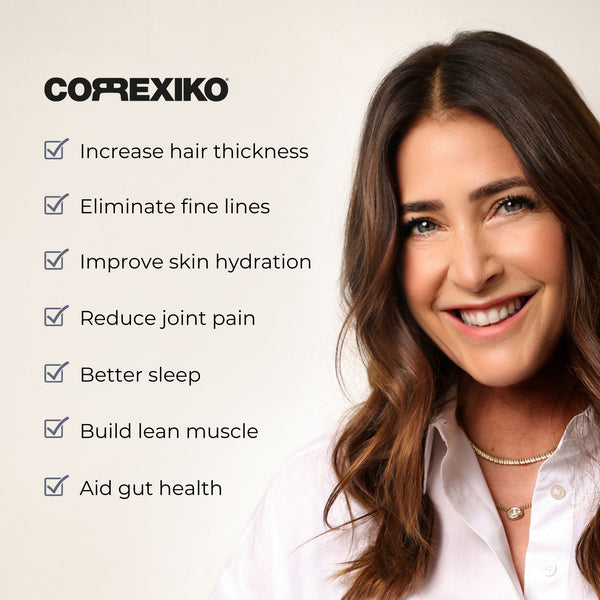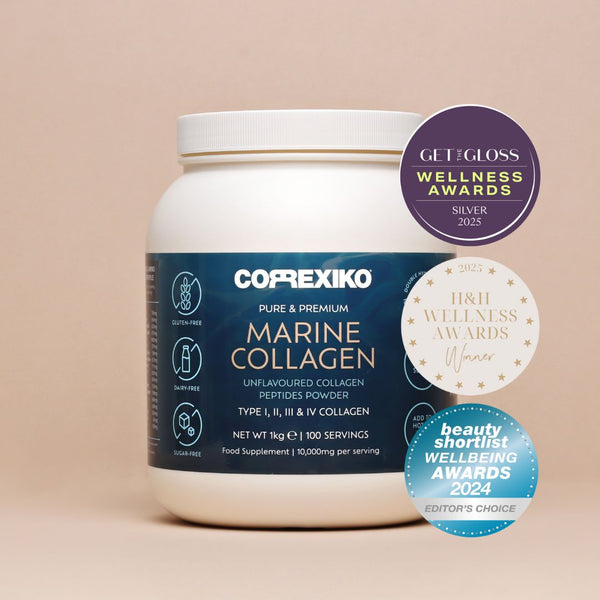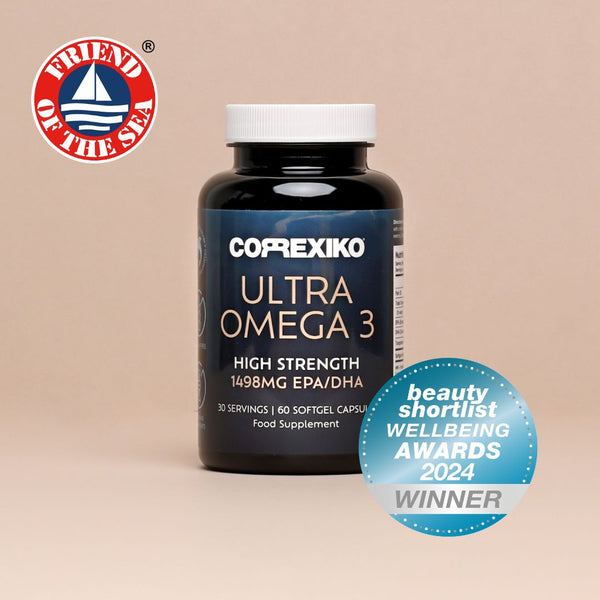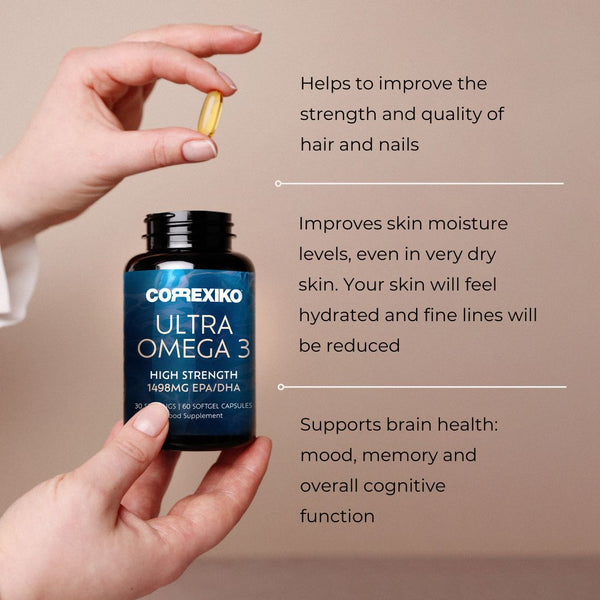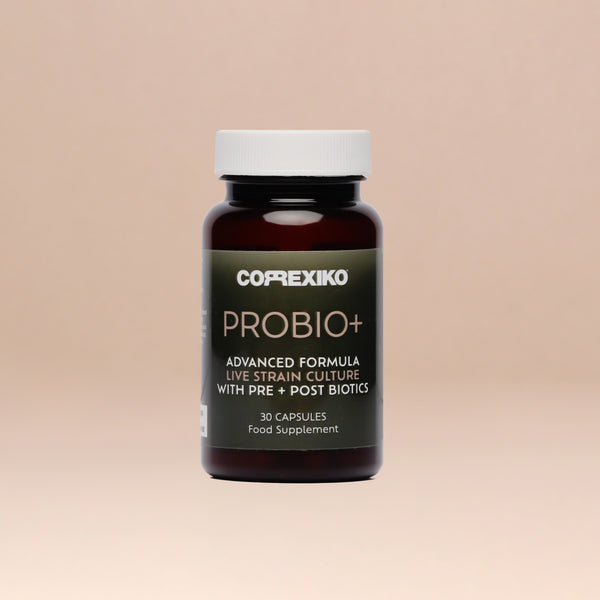
GUT HEALTH SPECIAL
ASK THE EXPERTS
We asked Dr Dinuk, a former NHS gastroenterologist and an expert in all things gut health, to share his many years of wisdom from working with patients to offer us some advice on what we can do to improve the health of our gut as we age and the beauty and well-being benefits we can expect.
Good Gut Health & Ageing. Correxiko founder, Dr Dinuk is a Gastroenterologist, and here's what you want to know about good gut health, glowing skin and longevity.
A healthy gut = good vitality and glowing skin!
Here's Dr Dinuk's advice on how taking care of our gut by eating certain foods can improve longevity and support everything from the radiance and hydration of our skin to our mood, sleep and immunity.

Q. What common symptoms can be experienced if our gut is not working effectively?
Poor gut health can manifest in various ways, as the gut plays a central role in many bodily functions. Below are common symptoms and signs that might indicate an imbalanced or unhealthy gut.
Digestive Issues: Bloating, gas, diarrhoea, constipation, heartburn or acid reflux, unexplained weight gain or loss.
Chronic Fatigue or Sleep Disturbances: An unhealthy gut can impact sleep quality and lead to chronic fatigue.
Frequent Infections or Illness: Since a significant portion of the immune system is in the gut, imbalances can make one more susceptible to viral or bacterial infections.
Skin Issues: Eczema, rosacea, acne, unexplained rashes or overly sensitive skin.
Frequent Headaches or Migraines: Some headaches or migraines can be linked to gut health, especially those related to certain food sensitivities.
Sugar Cravings: An overgrowth of certain types of bacteria or yeasts in the gut can increase cravings for sugar and refined carbs.
Bad Breath: Unpleasant breath can sometimes arise from indigestion or a disrupted microbiome.
Neurological Issues: Difficulty concentrating, brain fog, anxiety, depression.
Joint Pain: This can be related to systemic inflammation stemming from gut imbalances.
Vitamin and Mineral Deficiencies: Poor gut health can lead to malabsorption of essential nutrients.

Q. What has good gut health got to do with healthy ageing?
Good gut health has been increasingly recognised as a vital factor in overall health and well-being, with emerging research discovering various methods of how gut health influences ageing. Here are a few examples of this.
Microbiome Diversity: The gut microbiome refers to microorganisms living in our intestines. As we age, there is a decrease in the diversity of these microbes. A diverse microbiome is associated with better health outcomes, as a diverse microbial community can perform a wider range of metabolic functions and help maintain balance in the gut.
Inflammation: Chronic low-grade inflammation, often termed "inflammageing," has been linked to many age-related diseases like cardiovascular disease, Alzheimer's, and arthritis. An imbalanced gut microbiome, or dysbiosis, can increase gut permeability (often termed "leaky gut"), allowing bacteria and bacterial products to enter the bloodstream and cause inflammation.
Nutrient Absorption: As we age, our body's efficiency in absorbing nutrients declines. A healthy gut ensures the proper absorption of essential vitamins and minerals crucial for cellular function, bone health, and overall vitality.
Immune System Function: A significant portion of the immune system resides in the gut. The microbiome plays a crucial role in training and modulating the immune response. A healthy gut contributes to a robust immune system, which is especially vital as immunity can decrease with age.
Brain Health: The gut-brain axis refers to the bidirectional communication between the gut and the brain. The gut microbiome produces neurotransmitters and other metabolites which influence brain function and mood. Gut imbalance has been implicated in age-related mood disorders and neurological disorders.
Metabolism and Weight management: Ageing can be accompanied by changes in metabolism and an increased propensity for weight gain. The gut microbiome influences metabolism and fat storage. Maintaining a balanced microbiome can assist in weight management as we age.
Cellular Ageing: Preliminary research has suggested that the gut microbiome may influence the length of telomeres, the protective caps at the end of DNA strands that shorten as cells age—longer telomeres are associated with longer cell life and better health.
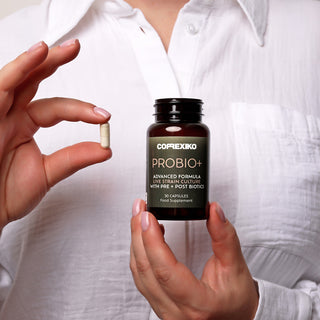
Q. How can the Correxiko Probio+ supplement work to improve gut and skin health?
Creating a supplement for gut health requires a thorough understanding of the human gut microbiome, the latest scientific research, regulatory standards, and pharmaceutical standard manufacturing practices. To create our Probio+ supplement, I worked closely with a team of leading scientists and supplement manufacturing experts to create the best quality gut health supplement on the market to help our customers benefit from good gut health.
We aimed to create a probiotic to replenish gut bacteria and provide specific nutrients for gut bacteria to thrive, support the gut lining, assist in digestion, boost the gut skin axis and work with our collagen and ultra Omega 3 to improve gut health synergistically.
Our strategy with Correxiko Probio+ was twofold: 1. to strengthen the overall gut microbiome 2. Specific strains of bacteria to boost the Gut Skin Axis
Your gut microbiome is a vast community of billions of bacteria and fungi that inhabit every nook and cranny of your gastrointestinal tract and has a major influence on your metabolism, body weight, skin health, propensity to illness, immune system, appetite and mood.
Skin Microbiome: Just like the gut, the skin has its own microbiome, which protects the skin and maintains its health. New research indicates that the gut microbiome, the Gut- Skin Axis, can influence the skin's microbial community, affecting skin health.
CORREXIKO ProBio+ provides 12 strains of good bacteria & fungi to give an optimal spectrum of cover, with a strength of 3 billion colony-forming units. The potency of the probiotics is boosted with a blend of prebiotics and postbiotics to give a complete probiotic supplement.
Prebiotics are the specific food needed for your Probiotics to thrive and reproduce. Postbiotics are the beneficial molecules produced by probiotic bacteria.
Some of the many benefits of our unique formula include: Assisting with overall digestive health and comfort, supporting healthy stool frequency and regular bowel movements, reducing occasional bloating, helping improve quality of life as impacted by digestive health, supporting perceived stress reduction as impacted by digestive health, contribute to healthy gut flora and support lactose digestion.

Q. How can improving gut health equal a more radiant complexion?
The skin is our body's largest organ, and its health is influenced by many internal and external factors, including the health of our gut microbiome.
Reduction in Inflammation: An imbalanced gut can lead to inflammation throughout the body. Inflammatory responses can exacerbate skin conditions like acne, eczema, rosacea, and psoriasis. Balancing the gut microbiome and reducing inflammation can improve these skin conditions, leading to clearer skin.
Improved Nutrient Absorption: A healthy gut can better absorb essential skin-supporting nutrients like antioxidants, vitamins (E and C), and minerals. These nutrients are crucial for skin health, repairing damage, and maintaining elasticity and hydration.
Hydration: Adequate hydration is crucial for skin health. Some gut issues can interfere with proper fluid and electrolyte balance, affecting skin hydration. A balanced gut can help maintain proper hydration, leading to plumper, more radiant skin.
Hormonal Balance: There's evidence that gut health can influence hormone balance. Since hormone imbalances (like fluctuations in oestrogen and testosterone) can lead to skin issues such as acne, managing gut health can help maintain a clearer complexion.
Reduced Stress: Gut health and mental well-being are intricately linked through the gut-brain axis. A balanced gut can lead to improved mood and reduced stress. Since stress can trigger or exacerbate skin issues, a calmer mind can support skin health.
Production of Beneficial Compounds: Certain beneficial gut bacteria produce compounds like short-chain fatty acids (e.g., butyrate) with anti-inflammatory properties. These can benefit the skin by reducing inflammation and oxidative stress.
Connection with Skin Microbiome: Just as the gut has its microbiome, the skin also has its unique microbial ecosystem. There's increasing evidence that the gut and skin microbiomes interact and influence each other. A balanced gut microbiome might help support a balanced skin microbiome, which is vital for skin health.

Q. What lifestyle factors can affect our gut health as we age?
Lifestyle factors can significantly influence gut health, with both positive and negative impacts on the composition and function of the gut microbiome.
Diet: A varied diet rich in whole foods can promote a diverse gut microbiome.
A diet rich in high-fibre foods like whole grains, fruits, and vegetables supports beneficial bacteria, and fermented foods like yoghurt, kimchi, sauerkraut, and kombucha introduce beneficial probiotics.
Reducing your intake of processed, sugary, or fatty foods will promote harmful bacteria that decrease vitality and immunity.
Physical Activity: Regular exercise has been linked to a more diverse gut microbiome and increased beneficial microbial species.
Sleep: Chronic sleep disruption can negatively impact the gut microbiome. Regular sleep patterns help maintain a balanced gut.
Stress: Chronic stress can lead to an imbalanced gut microbiome, reducing the abundance of beneficial bacteria and promoting harmful ones.
Medication: While Antibiotics are sometimes necessary, they can significantly disrupt the gut microbiome by killing harmful and beneficial bacteria. Prolonged use of antacids or non-steroidal anti-inflammatory drugs can affect gut health.
Alcohol and Smoking: Excessive alcohol consumption and smoking can disrupt the balance of the gut microbiome.
Hygiene: Over-sanitisation might reduce exposure to beneficial bacteria, but basic hygiene practices are essential to prevent harmful infections.
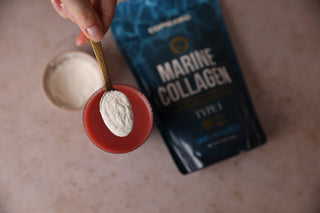
Can correxiko collagen help improve gut health?
The simple answer is YES! See below for more details.

Correxiko collagen helps gut health in several beneficial ways:
Gut Barrier Integrity: Collagen is an essential component of the connective tissues lining the gastrointestinal tract. Consuming collagen peptides helps support the integrity of this lining, preventing or mitigating "leaky gut" (increased intestinal permeability), where particles pass through the intestinal lining into the bloodstream, causing inflammation throughout the body.
Support Mucosal Layer: The gut has a protective mucosal layer that prevents pathogens and particles from adhering to the gut wall and causing inflammation. Correxiko collagen can support the maintenance of this mucosal barrier.
Digestive Enzyme Production: There's preliminary evidence to suggest that collagen peptides stimulate the production of digestive enzymes, facilitating better digestion and nutrient absorption.
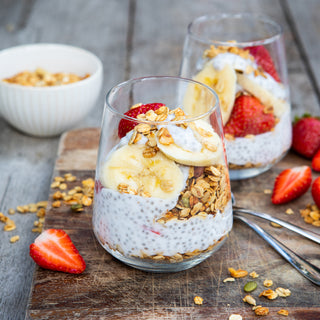
Q. What key foods should be incorporated into our diet to improve our gut health so we can age well?
Diet plays a pivotal role in shaping the gut microbiome, and certain foods can foster the growth of beneficial bacteria and support overall gut health.
Fibre-rich Foods: These are essential as they feed beneficial gut bacteria, such as whole grains, oats, quinoa, barley, whole wheat, and brown rice. Fruits and Vegetables: Especially those high in fibre like berries, bananas, apples, chard, kale, broccoli, and Brussels sprouts.
Fermented Foods: These contain probiotics and include foods such as yoghurt: Ideally, look for varieties without added sugars. Kefir: A fermented milk drink. Sauerkraut: Fermented cabbage. Kimchi: A Korean dish made from fermented vegetables. Tempeh: Fermented soy product. Miso: A Japanese seasoning made from fermented soybeans. Kombucha: Fermented tea. Prebiotic Foods: These foods feed your beneficial gut bacteria, such as garlic and onions, asparagus, leeks, bananas, and Jerusalem artichokes
Collagen and Collagen-boosting Foods to help strengthen the gut lining, such as bone broth, chicken skin, fish skin, egg whites, citrus fruits, and berries.
Polyphenol-rich Foods: Polyphenols are compounds found in many plant foods. They're digested by gut bacteria and can benefit the gut microbiome. These include green tea, dark chocolate and cocoa, almonds, blueberries and other berries, olives and Extra virgin olive oil.
Fatty Fish: Rich in omega-3 fatty acids, which can reduce inflammation and support gut health.
Top gut health tip - Skip the takeaways and packaged foods as often as you can and try to do as much home cooking as possible using fresh food to ensure you get the best quality nutrients and gut-friendly foods in your diet. There are plenty of healthy recipes online to give you some ideas.
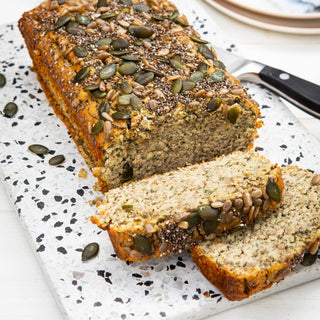
FREE RECIPE: BLOAT-FREE PALEO BREAD
This bread is a great addition to normal bread because it is gluten-free. Gluten is the protein found in wheat, barley and rye which can be quite difficult to break down in the digestive tract. 1 in 3 people have an intolerance to wheat which is why they experience digestive complaints such as bloating, pain and constipation. This bread is made of nuts, seeds and coconut flour all of which are packed with fibre and additional vitamins and minerals to nourish the body.
Get the recipe over on our blog:
Our best sellers
Look who’s been taking and loving our collagen!
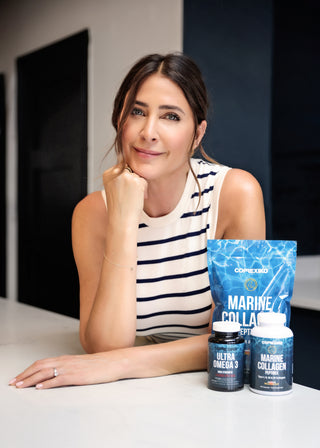
LISA SNOWDON
TV Personality, model and Correxiko Brand Ambassador

ABBEY CLANCY
Victoria's Secret Model, mum to 4 and TV Personality

JENNY POWELL
TV Personality, advocate for women's health

SARAH LINDSAY
Olympic Athlete, TV Personality, Entrepreneur & Coach

References:
1. Microbiome Diversity: Claesson, M. J. et al. (2012). Gut microbiota composition correlates with diet and health in the elderly. Nature, 488(7410), 178–184. - This study shows that elderly people with diverse microbiomes tend to be healthier.
2. Inflammation: Vaiserman, A. M., Koliada, A. K., & Marotta, F. (2017). Gut microbiota: A player in aging and a target for anti-aging intervention. Ageing Research Reviews, 35, 36–45. - This review discusses how gut dysbiosis can contribute to inflammation and ageing.
3. Nutrient Absorption: O'Toole, P. W., & Jeffery, I. B. (2015). Gut microbiota and aging. Science, 350(6265), 1214–1215. - This provides an overview of how gut microbiota can influence nutrient absorption, especially in the elderly.
4. Immune System Function: Belkaid, Y., & Hand, T. W. (2014). Role of the microbiota in immunity and inflammation. Cell, 157(1), 121–141. - The study outlines the intimate relationship between the gut microbiota and the immune system.
5. Brain Health: Cryan, J. F., & Dinan, T. G. (2012). Mind-altering microorganisms: the impact of the gut microbiota on brain and behaviour. Nature Reviews Neuroscience, 13(10), 701–712. - This review elaborates on the connection between the gut microbiome and brain health.
6. Metabolism and Weight Management: Turnbaugh, P. J., et al. (2006). An obesity-associated gut microbiome with increased capacity for energy harvest. Nature, 444(7122), 1027–1031. - This study demonstrates how the gut microbiome can influence obesity by altering energy harvest from the diet.
7. Cellular Ageing: Mailing, L. J., Allen, J. M., Buford, T. W., Fields, C. J., & Woods, J. A. (2019). Exercise and the Gut Microbiome: A Review of the Evidence, Potential Mechanisms, and Implications for Human Health. Exercise and Sport Sciences Reviews, 47(2), 75–85. - This review touches upon the potential impact of the gut microbiome on telomere length and cellular ageing.

